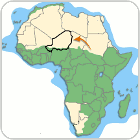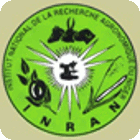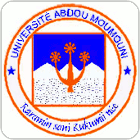 Niger's economy is largely agricultural in terms of employment, contribution to the GDP and food requirements of the population. As in most of the West African semi-arid tropics (the so-called Sahel), food production in Niger is essentially rainfed, based on sorghum and millet, and is insufficient in view of the needs of a rapidly growing population.
Niger's economy is largely agricultural in terms of employment, contribution to the GDP and food requirements of the population. As in most of the West African semi-arid tropics (the so-called Sahel), food production in Niger is essentially rainfed, based on sorghum and millet, and is insufficient in view of the needs of a rapidly growing population.
Agricultural research has been conducted in the country by French organizations since the 1930s with high emphasis on cash crops like cotton and groundnuts. After independence, Niger’s NARS began only in 1971 with the launching of the first agricultural university. Every plant breeding institute belongs to the public sector and essentially rely on donor funds. Plant biotechnology is in its infancy.
Technically, plant breeding in Niger is based on continuous testing of introduced germplasm which is favoured by international exchange. Activities focus primarily on major food crops including millet, sorghum, cowpea, groundnut and rice, as well as various minor crops.
Funding is a critical issue for research in general. For plant breeding, funding has been variable and highly dependent on outside sources. Insufficiency of both molecular techniques and laboratory infrastructure are regarded as important constraints to plant breeding.
Research and education institutes with activities in plant breeding
Public institutes
 |
National Agricultural Research Institute of Niger – Institut National de Recherche Agronomique du Niger (INRAN)
No Website available
INRAN is the main agricultural R&D agency in Niger, with the primary purpose to contribute to the attainment of food security and rural development. It was created by the Niger government in 1975 to replace various French research institutes operating in the country from colonial times on. Over time, INRAN has been administered by several ministries; however it has its own board of directors that decides on expenditures based on budget allocated by government. INRAN is involved in plant breeding since 1979 and directs most of its resources to line development and line evaluation of rice.
|
 |
Faculty of Agronomy – Faculté d’Agronomie (FA)
No Website available
Founded in 1971, FA is part of the publicly funded University of Niamey. Funding is primarily for teaching. Funding for research, including breeding, comes through collaborative projects with INRAN or development projects and usually involves a training effort. Some breeding and biotechnology-related research has been conducted over 4-9 years on sesame and fonio. Biotechnology work was conducted in collaboration with other organizations.
|
 |
Faculty of Sciences – Faculté des Sciences (FS), University of Abdou Moumouni
No Website available
Founded in 1971, FS is part of the publicly funded university of Niamey. Funding is primarily for teaching. Some funding for research on 'oseille' (or sorrel, a green leafy vegetable) was obtained through the United Nations University program on natural resources. From 2000 to 2004, a single scientist devoted half of his time to germplasm enhancement for oseille. So far the activity consists of collecting local germplasm in farmer fields for future evaluation for stress environments.
|
Privates Institutes
 |
National Seed Producers Association - Association des Producteurs Privés de Semences du Niger (APPSN)
No Website available
It is a private organization created in 1999 by individuals and farmer cooperatives interested in a professional umbrella organization for professionals in the seed business. It is member of the African Seed Trade Association (AFSTA). At this point APPSN, although a user of breeding results, does not conduct any breeding work; rather it relies on organizations including INRAN, ICRISAT, and the National Seed Service (SICCLA/DA) to obtain foundation seed of cereal varieties for increase and commercialization.
|
______________________________________
Information by Issoufou Kapran (2004) - Information based on the Niger's full report from the PBBC survey.
Last revised 24-03-2010, GIPB
 Niger's economy is largely agricultural in terms of employment, contribution to the GDP and food requirements of the population. As in most of the West African semi-arid tropics (the so-called Sahel), food production in Niger is essentially rainfed, based on sorghum and millet, and is insufficient in view of the needs of a rapidly growing population.
Niger's economy is largely agricultural in terms of employment, contribution to the GDP and food requirements of the population. As in most of the West African semi-arid tropics (the so-called Sahel), food production in Niger is essentially rainfed, based on sorghum and millet, and is insufficient in view of the needs of a rapidly growing population.



